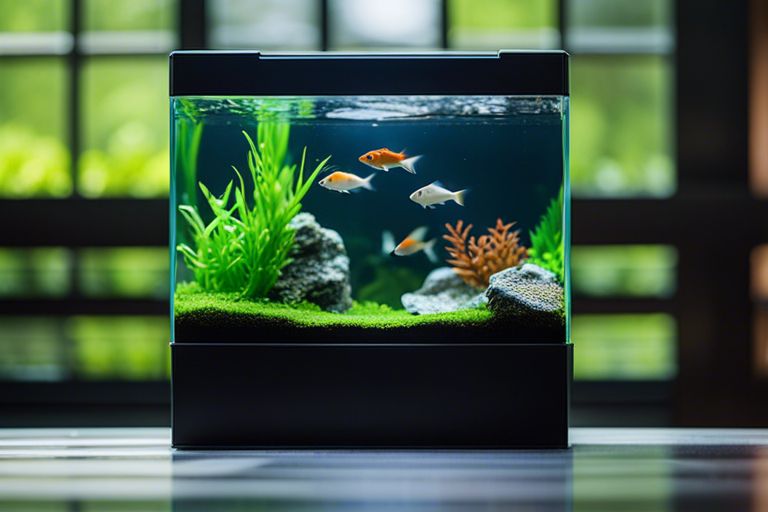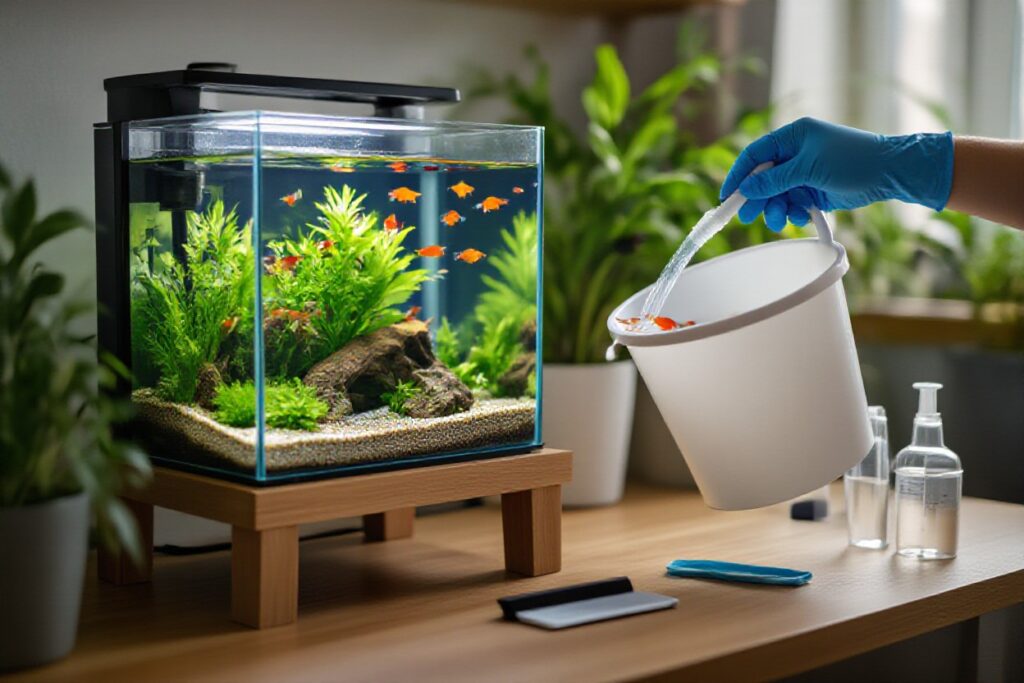Tips to ensure the well-being of your freshwater fish are crucial for their longevity and overall happiness in their environment. As a responsible fish keeper, it is important to understand the key factors that contribute to the health and vitality of your aquatic friends. In this top 10 list, we will investigate into expert advice on how to maintain the optimal conditions for your freshwater fish to thrive and flourish in their tank.
Proper Tank Setup
Suitable Size
To ensure the health and well-being of your freshwater fish, it is crucial to provide them with a suitable tank size. If the tank is too small, fish can become stressed, leading to a compromised immune system and increased susceptibility to diseases. As a general rule, aim for a tank that can accommodate at least 1 gallon of water per inch of fish to allow them enough space to swim and thrive.
Right Habitat
Even the most robust fish species require a specific habitat to thrive in captivity. If you are keeping freshwater fish, ensure that the tank setup replicates their natural environment as closely as possible. This includes incorporating appropriate substrate, plants, hiding spots, and water parameters such as temperature and pH levels to mimic their native habitat.
Plus, providing a well-maintained and suitable habitat can help reduce stress levels in your fish, promoting better health and overall vitality. Pay attention to the specific needs of the fish species you are keeping and make adjustments to the tank setup accordingly.
Regular Water Changes
Scheduled Maintenance
Some of the most important tasks in maintaining a healthy freshwater aquarium involve regular water changes. Scheduled maintenance is crucial for removing excess waste and harmful substances from the water, promoting a clean and stable environment for your fish to thrive. By sticking to a consistent schedule for water changes, you can prevent the accumulation of toxins and keep your aquarium in tip-top condition.
Waste Management
On the topic of waste management, ensuring that uneaten food, plant debris, and fish waste are promptly removed from the tank is key to maintaining water quality. Over time, these organic materials can break down and release harmful ammonia and nitrites into the water, posing a threat to your fish’s health. Regular vacuuming of the substrate and cleaning of filter media are important tasks to prevent waste buildup and maintain good water parameters.
Plus, incorporating live plants into your aquarium can help with waste management by absorbing some of the excess nutrients and providing natural filtration. Additionally, introducing snails or shrimp can assist in cleaning up any leftover food or detritus, contributing to a cleaner and healthier aquatic environment for your fish.

Balanced Diet
You play a crucial role in ensuring the health and vitality of your freshwater fish by providing them with a balanced diet. A diet that meets all their nutritional needs will help them thrive and prevent diseases. Here are some tips to help you achieve this:
Nutritional Food
Food made specifically for freshwater fish is the best option as it contains the necessary nutrients they need to stay healthy. Look for high-quality fish food that is appropriate for the species you have. Variety is key, so consider offering a mix of flakes, pellets, frozen, and live foods to provide a well-rounded diet.
Feeding Routine
The key to a successful feeding routine is consistency. Establish a regular feeding schedule and stick to it. Overfeeding can lead to water quality issues in your aquarium, so be mindful of the amount you are offering. In general, it’s best to feed small amounts multiple times a day rather than a large amount once a day.
This regular feeding routine will also allow you to observe your fish closely for any changes in behavior or appetite, which can be early indicators of health issues. Additionally, avoid leaving uneaten food in the tank for too long as it can deteriorate water quality.
Monitor Water Parameters
pH Levels
Little fluctuations in pH levels can have a big impact on the health of your freshwater fish. It is imperative to regularly test and maintain the pH of your aquarium water to ensure a stable environment for your fish. Most freshwater fish prefer a pH level between 6.5 and 7.5, so be sure to make adjustments as needed to keep your fish healthy.
Temperature Control
Even small changes in temperature can stress out your freshwater fish and make them susceptible to diseases. It is crucial to keep the water temperature within the ideal range for your fish species. Use a reliable thermometer to monitor the temperature consistently and consider investing in a heater or cooler to maintain stability.
| Too High | Too Low |
| High temperatures can lead to oxygen depletion and stress on fish. | Low temperatures can slow down the metabolism of fish and affect their immune system. |
This is particularly important for tropical fish species that require specific temperature ranges to thrive. Make sure to acclimate new fish properly to prevent temperature shock, and always keep an eye on any fluctuations that may occur.
| Key Points | Tips |
| Regularly monitor and maintain pH levels to prevent stress on fish. | Invest in a high-quality pH testing kit to ensure accurate readings. |
| Keep the water temperature stable within the recommended range for your fish. | Consider using a programmable heater to maintain consistent temperatures. |

Adequate Filtration System
Filter Efficiency
Efficiency is key when it comes to the filtration system in your freshwater aquarium. Make sure you select a filter that is appropriate for the size of your tank and the number of fish you have. A good rule of thumb is to choose a filter that can process at least four times the total water volume of your tank per hour. This will help ensure that waste and toxins are efficiently removed, keeping your fish healthy.
Regular Cleaning
The cleanliness of your filtration system plays a crucial role in the overall health of your freshwater fish. It is imperative to establish a regular cleaning schedule for your filter to prevent debris buildup and maintain optimal performance. By following the manufacturer’s guidelines for cleaning and maintenance, you can prevent clogs and ensure that the filter is operating effectively.
It is recommended to clean mechanical filter media every 2-4 weeks to prevent blockages and maintain water flow. Biological filter media should be rinsed gently in old tank water to preserve beneficial bacteria.

Prevent Overcrowding
Space Management
Once again, one of the most crucial aspects of maintaining the health of your freshwater fish is to prevent overcrowding in your tank. It is crucial to provide enough space for each fish to swim freely without feeling cramped. Overcrowding can lead to stress, aggression, and the spread of diseases among your fish.
Stress Reduction
There’s an undeniable link between overcrowding and increased stress levels in freshwater fish. Stress can weaken the immune system of your fish, making them more susceptible to diseases. To reduce stress in your aquarium, ensure that you have an appropriate number of fish for the size of your tank.
With proper space management and a well-planned stocking strategy, you can create a harmonious environment for your freshwater fish to thrive and stay healthy.
Disease Prevention
Quarantine Newcomers
Many diseases can be introduced to your freshwater fish tank through new fish, plants, or decorations. Clearly, the best way to prevent these diseases from spreading is to quarantine any new additions before introducing them to your main tank. A separate quarantine tank will allow you to monitor the health of the new fish and treat any potential illnesses before they have a chance to infect your established tank residents.
Watch for Symptoms
An vital aspect of disease prevention is to watch for symptoms of illness in your freshwater fish. It is crucial to observe your fish regularly for signs of disease, such as changes in behavior, appetite, or physical appearance. If you notice any abnormalities, it’s vital to take action immediately to prevent the spread of illness to other fish in the tank. Regular monitoring and early intervention can be key to maintaining the health of your freshwater fish.
It’s also vital to educate yourself about common freshwater fish diseases and their symptoms. Understanding the signs of illness can help you identify and treat diseases promptly, increasing the likelihood of a successful outcome for your fish. Recall, prevention is always better than cure when it comes to maintaining the health of your freshwater fish.
Handle With Care
Gentle Interaction
Even though freshwater fish may seem resilient, they are delicate creatures that should be handled with care. When interacting with your fish, avoid sudden movements and loud noises that can startle them. Use a soft net or your hands gently to catch or move them when necessary. Bear in mind, the less stress you cause, the healthier your fish will be.
Stress-Free Environment
Assuming a stress-free environment for your freshwater fish is crucial to maintaining their health. Factors such as water quality, temperature, and tank mates can all contribute to their stress levels. Ensure that your aquarium is properly cycled, maintain stable water parameters, and provide plenty of hiding spots for shy fish. Keeping a peaceful and well-maintained tank will help reduce stress and promote overall well-being.
Educate Yourself
Fish Needs
For freshwater fish to thrive in your aquarium, it is imperative to understand their basic needs. These include water quality, appropriate tank size, proper diet, and compatible tank mates. Research the specific requirements of the fish species you have to ensure you can provide them with a healthy environment.
Ongoing Learning
Clearly, educating yourself about freshwater fish care is an ongoing process. Stay informed by reading books, attending workshops, and joining online forums to learn from experienced hobbyists. Keeping up-to-date with the latest research and advancements in aquaculture will help you make informed decisions about your fish’s well-being.
The more you know about the biology and behavior of your freshwater fish, the better equipped you will be to provide them with a suitable habitat. Continuous learning not only benefits your fish but also enhances your enjoyment of this rewarding hobby.
Summing up
Taking this into account, adhering to the top 10 tips for maintaining freshwater fish health is crucial for ensuring the well-being and longevity of your aquatic pets. By following these guidelines and implementing proper care practices such as maintaining water quality, providing a balanced diet, and monitoring your fish for signs of illness, you can create a healthy and thriving environment for your freshwater fish. Recall, prevention is key when it comes to fish health, so stay proactive and attentive to their needs to prevent any potential issues. With these tips in mind, you can enjoy a vibrant and flourishing aquarium for years to come.
FAQ
Q: What are the key factors to consider for maintaining freshwater fish health?
A: Providing clean water, proper diet, suitable tank mates, adequate tank size, and suitable water parameters are key factors to maintaining freshwater fish health.
Q: How often should I clean my fish tank?
A: It is recommended to clean your fish tank every 2-4 weeks by performing partial water changes and cleaning the gravel to remove debris and uneaten food.
Q: What is the importance of monitoring water parameters in a fish tank?
A: Monitoring water parameters such as temperature, pH, ammonia, nitrite, and nitrate levels is crucial to ensure a healthy environment for freshwater fish as any fluctuations can stress or harm the fish.
Q: How can I prevent diseases in freshwater fish?
A: Regularly quarantining new fish before introducing them to an established tank, maintaining good water quality, and avoiding overfeeding can help prevent diseases in freshwater fish.
Q: What is the significance of providing a varied diet for freshwater fish?
A: Offering a diverse diet that includes quality flakes, pellets, live or frozen foods ensures that freshwater fish receive all the imperative nutrients they need for optimal health and growth.
Q: Why is it important to acclimate new fish to the tank environment?
A: Acclimating new fish helps them adjust gradually to the tank’s water parameters, reducing stress and the risk of shock, which can occur when introducing fish directly into a new environment.
Q: How can I create a stress-free environment for freshwater fish?
A: Providing adequate hiding spots, maintaining stable water conditions, minimizing sudden changes, and ensuring proper tank mates can help create a stress-free environment for freshwater fish.











